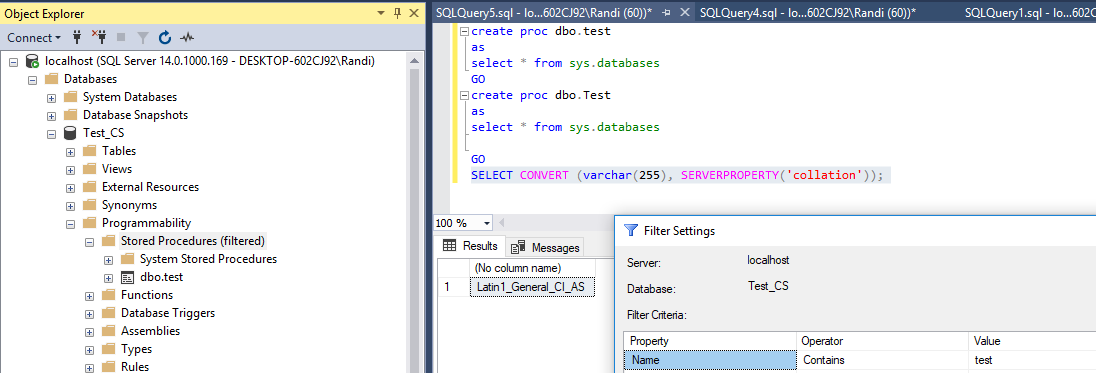Using the profiler to capture the queries that runs when applying the Contains filter, I found the query:
exec sp_executesql N'SELECT
sp.name AS [Name],
SCHEMA_NAME(sp.schema_id) AS [Schema],
''Server[@Name='' + quotename(CAST(
serverproperty(N''Servername'')
AS sysname),'''''''') + '']'' + ''/Database[@Name='' + quotename(db_name(),'''''''') + '']'' + ''/StoredProcedure[@Name='' + quotename(sp.name,'''''''') + '' and @Schema='' + quotename(SCHEMA_NAME(sp.schema_id),'''''''') + '']'' AS [Urn],
sp.create_date AS [CreateDate],
ISNULL(ssp.name, N'''') AS [Owner],
CAST(CASE WHEN ISNULL(smsp.definition, ssmsp.definition) IS NULL THEN 1 ELSE 0 END AS bit) AS [IsEncrypted],
CASE WHEN sp.type = N''P'' THEN 1 WHEN sp.type = N''PC'' THEN 2 ELSE 1 END AS [ImplementationType],
ISNULL(sm.uses_native_compilation,0) AS [IsNativelyCompiled]
FROM
sys.all_objects AS sp
LEFT OUTER JOIN sys.database_principals AS ssp ON ssp.principal_id = ISNULL(sp.principal_id, (OBJECTPROPERTY(sp.object_id, ''OwnerId'')))
LEFT OUTER JOIN sys.sql_modules AS smsp ON smsp.object_id = sp.object_id
LEFT OUTER JOIN sys.system_sql_modules AS ssmsp ON ssmsp.object_id = sp.object_id
LEFT OUTER JOIN sys.all_sql_modules AS sm ON sm.object_id = sp.object_id
WHERE
(sp.type = @_msparam_0 OR sp.type = @_msparam_1 OR sp.type=@_msparam_2)and(CAST(
case
when sp.is_ms_shipped = 1 then 1
when (
select
major_id
from
sys.extended_properties
where
major_id = sp.object_id and
minor_id = 0 and
class = 1 and
name = N''microsoft_database_tools_support'')
is not null then 1
else 0
end
AS bit)=@_msparam_3 and ISNULL(sm.uses_native_compilation,0)=@_msparam_4 and sp.name like N''%Test%'')',N'@_msparam_0 nvarchar(4000),@_msparam_1 nvarchar(4000),@_msparam_2 nvarchar(4000),@_msparam_3 nvarchar(4000),@_msparam_4 nvarchar(4000)',@_msparam_0=N'P',@_msparam_1=N'RF',@_msparam_2=N'PC',@_msparam_3=N'0',@_msparam_4=N'1'
Which contains the part:
and sp.name like N''%Test%''
As @BobKlimes noted, which means it is not possible on CS Servers.
It also appears to not be possible on CS DB's on CI Servers:
As a result, we have the same issue as you noted in the added link.
Unless you find where the query is stored and change it, I don't think there is a way around it.

